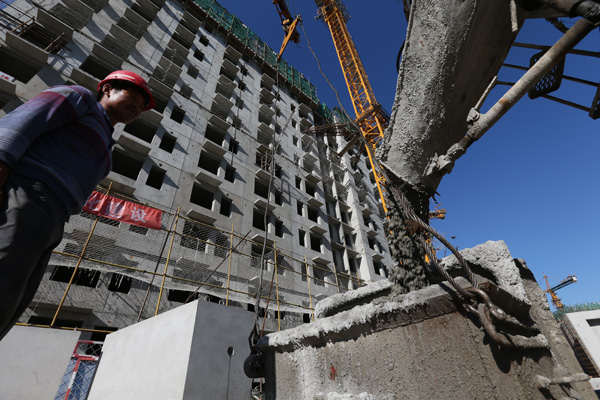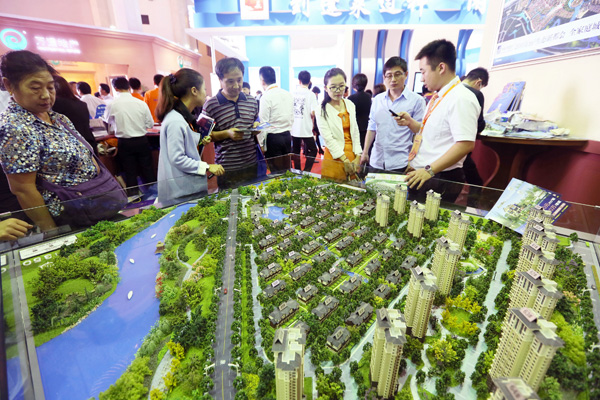When the economy slows, housing sector slackens too, tycoon says
Real estate tycoon Ren Zhiqiang never seems to be afraid to air his views, often in strong terms, and when he airs them, a lot of people sit up and take notice.
But one of Ren's recent prognostications has drawn more interest than usual because he seems to have had a complete change of heart on where the Chinese property market is heading.
Over the past few years, Ren has gained a reputation for being one of the firmest believers in the strength of the market. However, in a recent interview he said that, despite continued economic growth, it was looking more and more unlikely that the real estate market would be able to pull itself out of its current malaise.
Ren, chairman of Huayuan Property Co Ltd of Beijing, has a strong market statistics base and a research team. Most of his forecasts in the past few years have proved to be accurate.
For some industry insiders that has given Ren's change of perspective extra credence, suggesting that China's real estate market, especially in smaller cities with huge supply, now faces serious problems.
"When the economy trends down, the real estate sector slackens too," Ren said. "This rule applies the world over; China is no exception. Incomes and consumption are certain to weaken in this sluggish economy."
Economic figures for August painted a gloomy picture: industrial output grew at the slowest pace since 2008 amid the global financial crisis, and fixed-assets investment, an important driver of economic activity, slowed to a 14-year low of 16.5 percent in the first eight months of the year.
Analysts with ANZ said China's GDP growth may slip to 6.5 to 7 percent in the third quarter if the September numbers remain weak.
In the same period, the country's real estate market, once regarded as an important growth engine for the world's second-largest economy, showed new signs of cooling as more cities reported month-on-month price drops.
In the 70 big Chinese cities tracked by the government, new homes in 68 had month-on-month price declines in August, compared with 64 in July, the National Bureau of Statistics said. That marked the biggest drop since January 2011, when China changed the way it compiles the data.
Average monthly real estate investment has slowed to 13.2 percent year-on-year in the first eight months of the year, from 13.7 percent in the first seven months, the bureau said. The total area of property sales and sales volume fell too.
Many analysts are concerned that the weakening real estate market, apart from being a drag on the overall economy, may be a trigger for the crisis of local government debt. However, things may not be quite as bad as that.

A building construction site in Tongzhou, Beijing. The National Bureau of Statistics said new homes in 68 of 70 big Chinese cities had month-on-month price declines in August, compared with 64 in July. [Photo provided to China Daily]
Most local and regional governments in China have sufficient resources to weather the impact of a property market downturn, a report by Standard & Poor's says.
"We believe most Chinese local and regional governments can tide over a 50 percent decline in property-related revenue over the next year or so," said Standard & Poor's credit analyst Liang Zhong. "We estimate that property-related revenue accounted for roughly 20 percent of their total revenue in 2013."
The report said that some of the measures the local and regional governments can take to deal with the problem are cutting non-core spending, strengthening the collection of revenue, using their sizable fiscal reserves or selling some assets. However, the benefits from these are likely to be short term.
"We believe reforms such as public-private partnerships and implementing residentialproperty taxes can provide a long-term solution to reducing local and regional governments' vulnerability to property market downturns," Zhong said.
Despite sluggishness in themass residential market, sales in the high-end market in Beijing and Shanghai remain good.
"Demand for high-end residential real estate has remained relatively stable in Shanghai," said Carlby Xie, head of research at global real estate consultancy Colliers International. "As a result, the transaction volume of high-end projects has risen, in contrast to a decline in mass-market housing."
Between January and August, sales in Shanghai's housing market totaled 5.42 million square meters, down about 30 percent year-on-year. In the same period, sales of high-end residential properties (defined as 40,000 yuan per sq m or above) rose 5.1 percent year-on-year to 964,000 sq m, Colliers said.
The contours of Beijing's market were similar. A high-end project developed by Poly Real Estate Group, for instance, sold out more than 100 apartments valued 2.5 billion yuan on the first day it was open for sale in September, said Niu Yi, the project's marketing chief. The unit price of the project was reported to be about 90,000 yuan per sq m.
Shen Linan, assistant president of Shenzhen-listed Thai Hot Group, a real estate company that specializes in developing upmarket residential projects, said the demand for luxury apartments andvillas valued between 10 million and 20 million yuan is strong in Beijing and sales have been brisk this year.
Despite the sluggish residential market, Thai Hot's net profit rose 5.95 percent to 424 million yuan in the first half of the year, thanks to its commitments to high-end projects in Beijing and Shanghai.
"We will maintain our sales project of 25 billion yuan for 2014," Shen said.
For Chen Haoyu, deputy-marketing chief of Oceanwide Holdings' Beijing branch, high-end project housing buyers are more rational and are not so readily influenced by changes in the market.
"Price is not the only factor they are considering," Chen said. "What they care about most is the product itself. Given the experience of the past few years, the annual sales of luxury apartments or villas valued 30 million to 40 million yuan is almost at the same level despite the ups and downs in the market."
The Shenzhen-listed Oceanwide is about to launch the second phase of a luxury project near Chaoyang Park in Beijing, with the unit sale price ranging from 100,000 yuan to 12,000 yuan per square meter.
"It is normal to see a difference in the performance of different types of properties and different cities as the real estate sector is market driven," Qin Hong, director of the policy research center at theMinistry of Housing and Urban-Rural Development, told a recent forum organized by the China Index Academy. "And the trend will continue in the coming years."
With more property developers offering bigger discounts to stimulate sales and more local governments easing home purchase restrictions, sales in the second half of the year will be better than in the first, said Sang Yufeng, an analyst with real estate agency Century 21.
So far, of the 46 cities that had limits on home purchases, only six, including the four biggest cities of Beijing, Shanghai, Guangzhou and Shenzhen, have kept those restrictions. "As the chances of a relaxation in mortgage policies rise, we believe buying opportunities are on their way," Sang said.
A document jointly issued by the People's Bank of China and the China Banking Regulatory Commission on Sept 30 says those who have fully repaid mortgages on previously bought homes will be treated as first-time homebuyers when it comes to financing for new residences.

Visitors at a housing fair in Beijing in September. Despite sluggishness in the mass residential market, sales in the high-end market in Beijing and Shanghai remain good. [Photo provided to China Daily]